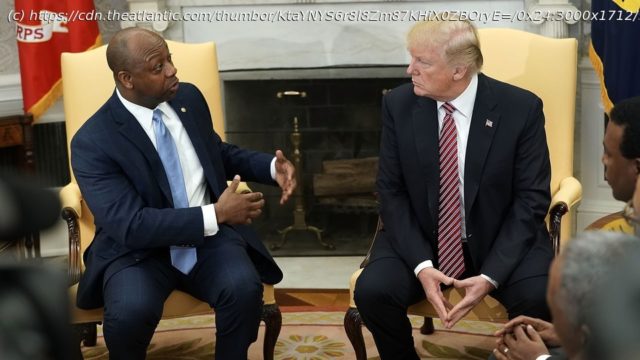Donald Trump’s rivals are in denial.
Senator Tim Scott today joined the ranks of GOP candidates hoping to displace Donald Trump as the party’s nominee. America would be better off if one of them could win, but the GOP is no longer a normal political party.
Thanos From Queens
Tim Scott of South Carolina joined the field of Republican contenders for the GOP presidential nomination today. He’s polling in single digits among primary voters, as are all of the other (so far) declared candidates. Only Governor Ron DeSantis of Florida is managing to get out of the basement—rumors are that he will announce his candidacy this week—and even he is getting walloped by Donald Trump in polls of the Republican faithful.
Scott seems like a classic no-hoper presidential prospect but a strong choice for vice president, which of course is why some weaker candidates run and then bow out (see “Harris, Kamala”). The current GOP field, however, includes at least some politicians who should be credible alternatives to Trump: In any other year, people such as DeSantis, Nikki Haley, and Asa Hutchinson, all current or former governors from the South, would be obvious contenders. Instead, their campaigns are flailing about in limbo while the rest of the field is populated by the likes of the wealthy gadfly Vivek Ramaswamy and the radio-talk-show host Larry Elder.
Of course, in a normal year, a twice-impeached president who has been held liable for sexual abuse would do the decent thing and vanish from public life.
The United States desperately needs a normal presidential election, the kind of election that is not shadowed by gloom and violence and weirdos in freaky costumes pushing conspiracy theories. Americans surely remember a time when two candidates (sometimes with an independent crashing the gates) had debates, argued about national policy, and made the case for having the vision and talent and experience to serve as the chief executive of a superpower. Sure, those elections were full of nasty smears and dirty tricks, but they were always recognizable as part of a grand tradition stretching all the way back to Thomas Jefferson and John Adams—rivals and patriots who traded ugly blows—of contenders fighting hard to secure the public’s blessing to hold power for four years.






